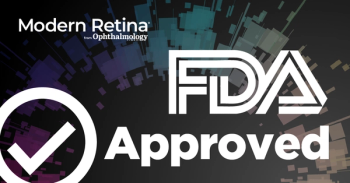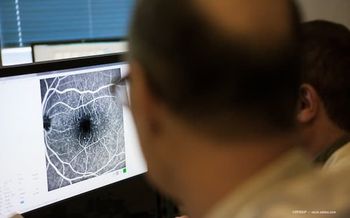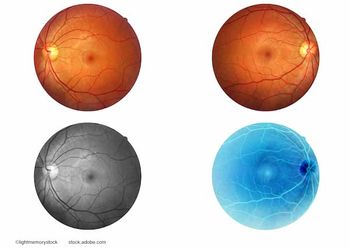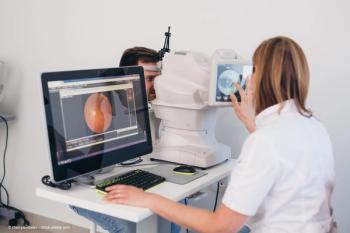
Cell therapy trial may lead to treatment for dry AMD, geographic atrophy
The OpRegen trial is a cell therapy trial, looking to explore potential safety and efficacy for patients with advanced dry age-related macular degeneration (AMD).
At ARVO 2022, Allen C. Ho, MD, FACS, presented Phase 1/2a data RG6501 (OpRegen), a retinal pigment epithelium cell transplant therapy currently in development for the treatment of dry age-related macular degeneration (AMD). His presentation, entitled, “Safety and Efficacy of a Phase 1/2a Clinical Trial of Transplanted Allogeneic Retinal Pigmented Epithelium (RPE, OpRegen) Cells in Advanced Dry Age-Related Macular Degeneration (AMD),” detailed the full results of the trial, which met its primary endpoints and will be moving onto the next phase of research.
Dr. Ho serves as the Wills Eye Institute Attending Surgeon and Director of Retina Research, and he is a professor of ophthalmology at Thomas Jefferson University.
Video transcript
I'm Allen Ho, and I am a retina surgeon at Wills Eye Hospital, Mid Atlantic Retina and the director of retina research.
So the OpRegen trial is a cell therapy trial, looking to explore potential safety and efficacy for patients with advanced dry age-related macular degeneration (AMD).
If you think about this group of patients — which are growing as baby boomers are enlarging — this is a study to attempt to address the dry form, we currently have treatments for the wet form, including injections, and we're developing treatments for the dry form. This is an attempt with cell therapy to see if we can slow down, stop, or even potentially reverse, vision loss in this group of patients.
There is a great unmet need for patients with advanced dry macular degeneration. In other words, there's no specific treatment for geographic atrophy. We have some programs now — and it's kind of exciting — that are thinking about slowing down the progression of aging, or atrophy, in patients with this condition.... [and] they involve injections.
This is a study looking at a different approach using cell therapy. And in this phase 1/2, non-randomized study, we're seeing a good safety profile with this stem cell line surgically placed under the retina. And most of the patients who had any issues that were reported on safety, were with respect to, for example, the surgical procedure itself with some redness of the eye.
We did see some epiretinal membrane formation, three of which was significant and required surgery in the study. And this is three out of 24 only.
To reiterate, the safety profile of the OpRegen program is very well-tolerated. I want to also add that when you put cells in an eye — [and] these are human allogeneic cells — you have to watch carefully for inflammation, either acute or delayed, or rejection of the cell line. We saw none of that, so the cells are very well-tolerated.
With respect to the different cohorts in observations there, it kind of makes sense that if you try and solve a problem... for example, when the house is not totally burned down, like the initial cohorts that were legally blind with larger areas of atrophy, we saw good safety there and some signals of activity of the cells. But when we looked at cohort four, which was 12 out of the 24 subjects, again, good safety, but also some very promising signs of activity that need to be explored in a larger randomized program.
Specifically, we saw about a seven letter improvement — 7.6 letter improvement — in cohort. Four of those patients with smaller areas of atrophy, and better vision ... about 21/25 starting vision. And we saw interesting structural changes on the OCT, overlying what we presume was the cell deposition in areas of atrophy and some improvement in the retinal architecture where we had transplanted the cell line.
So we're seeing some promising results that need to be explored more, both with respect to anatomy and activity, and even vision with the caveat that this is an open label study. We need to understand these results in the context of a randomized trial. I think we're beginning to understand and refine who the right patient group is. Again, if you think about the goal of trying to slow, or stop, or even reverse aging in any part of your body is a lofty goal but we're seeing promising signals that really need to be explored in a randomized fashion so that we can generate data with confidence and hopefully deliver this to patients in the future.
Note: This transcript has been lightly edited for clarity.
Newsletter
Keep your retina practice on the forefront—subscribe for expert analysis and emerging trends in retinal disease management.




























